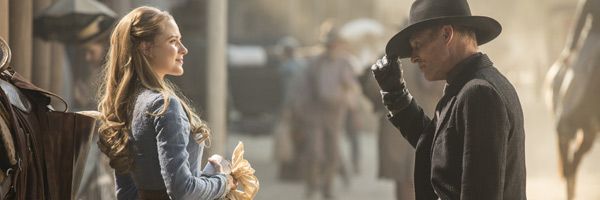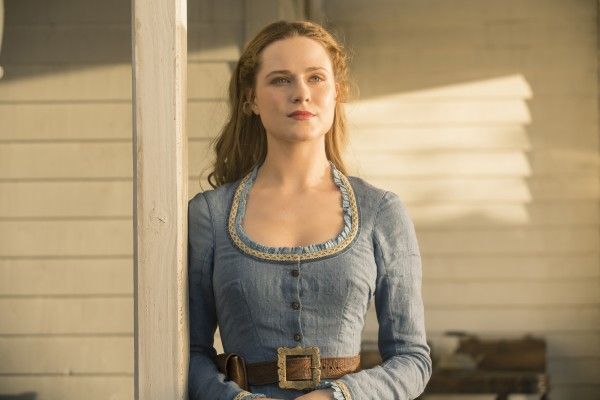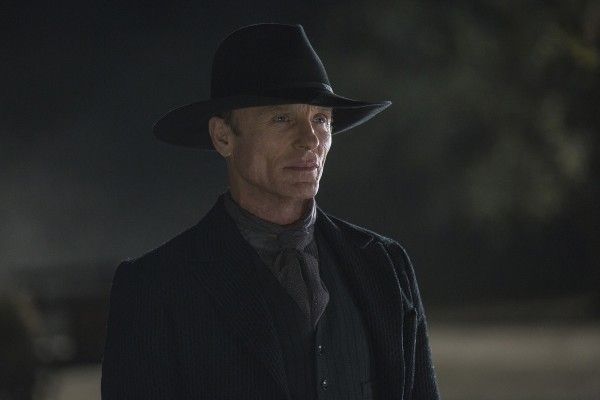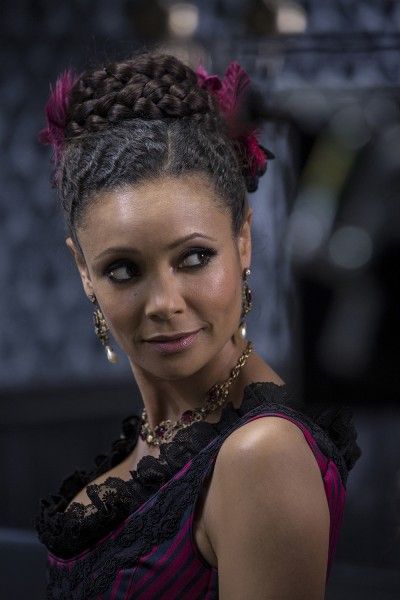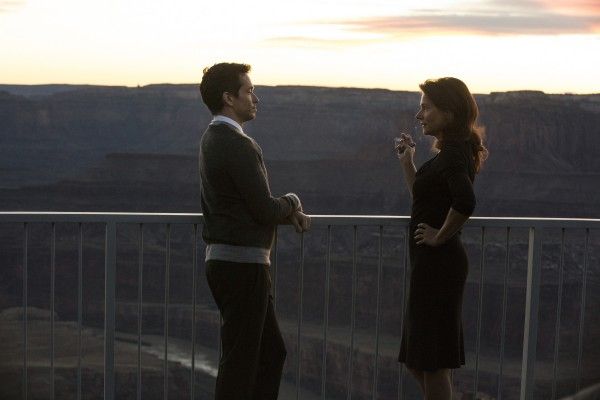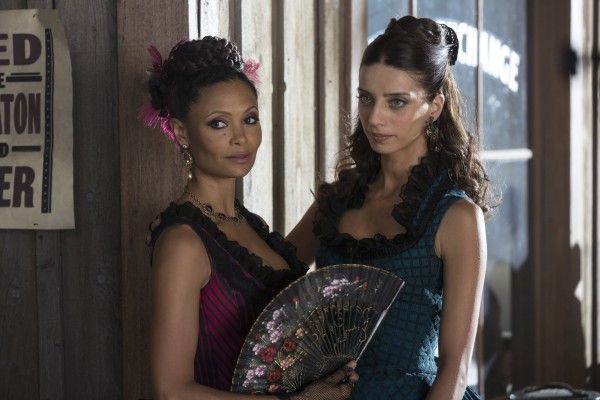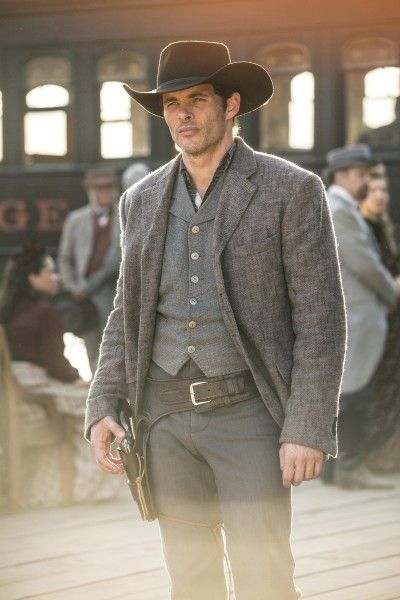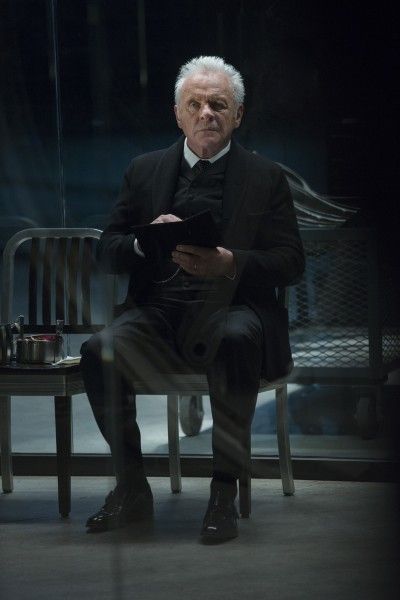The premiere episode of Westworld isn’t interested in holding your hand. It’s not interested in too carefully delineating how this adult theme park works. And it’s really not interested in giving you just one side of this creator/host/visitor trichotomy to support. Like Game of Thrones before it, Westworld is not afraid of challenging its audience when it comes to messy morals and enigmatic plotting. And, like Game of Thrones, Westworld has a nascent confidence that implies the experience will be worth the narrative effort. What does that all mean? Basically, everything is about to go to hell (or rather, as Peter Abernathy suggests, hell is coming to Westworld) and we are going to feel really conflicted about it.
A lot happens in the first hour-and-a-bit of HBO’s wonderfully self-reflective new series. We are introduced to Westworld, an adult theme park where people can pay $40,000 per day to fuck and/or kill their way through the Wild West. In watching the first episode, I was reminded of about a dozen other movies and TV shows, most especially Joss Whedon’s Dollhouse, the ongoing AMC international co-production Humans, classic the-robots-are-among-us drama Battlestar Galactica, as well as Prometheus, Ex Machina, and dystopian YA franchise The Hunger Games. But these are thematic similarities (the best kind) more than anything. Westworld isn’t redundant, but rather, it joins in an ongoing cultural conversation. And though it may be too early to tell if it has anything worthwhile to add to this conversation concerning science as religion, corporate negligence, artificial intelligence, and the ways we dehumanize entire groups in order to justify violence and oppression, the show is certainly off to an auspicious start.
Evan Rachel Wood’s Dolores is our gateway character in an ensemble filled with characters who are often uncomfortably easy to empathize with (I blame the great cast). Dolores’ debrief voiceover serves as a graceful expository frame tale guiding us in and out of the episode. And, right now, this is her story. It’s easy to sympathize with Dolores. This pilot may be called “The Original,” presumably a reference to Dolores status as the oldest host in the park, but it could have been called “Dolores and the Terrible, Horrible, No Good, Very Bad Day.” In this first installment, she sees her boyfriend die (twice), her mother and father die once, her father slip into some kind of stroke-like existential crisis, and she is raped. (Thankfully, the sexual violence happens off-screen, a fact that immediately ingratiates this show to me.) I’m just glad she got in some time for her painting.
James Marsden is perfectly cast as Teddy Flood, the heroic good guy who is destined to lose (a role he perfected in X-Men, Superman Returns, and The Notebook). The love story between Teddy and Dolores is perfect example of how Westworld can have its cliche cake and eat it, too. Cliches are literally the point of this world, where people go to take place in familiar pop culture narratives (in this case tropes of the western). Dolores and Teddy’s relationship is a traditional love story that modern audiences might be tempted to roll their eyes at, if not for the fact that we know it is programmed to be a trope. They love each other because they are meant to, because that’s what would have happened in The Searchers. Where that programming stops and a true love begins is the question at the very center of artificial intelligence and this show. Do they only love each other because they are supposed to? Does it matter? Will how they feel about one another change as the update and its “reveries” continue to affect the androids?
Elsewhere in Westworld, Ed Harris’ Gunslinger is on a one-man mission to find the deeper game to play, and he doesn’t care who he rapes, kills, or tortures to do it. The Gunslinger dehumanizes the androids around him in a way that is different from newcomers to the park, so much so that I spent much of the first episode trying to decide if the Gunslinger is human or android. In the film on which the show is loosely based, the Gunslinger is the chief antagonistic android presence. When his programming that keeps him from losing every duel goes wrong, he starts hunting down the Westworld guests. Will the Westworld TV show keep to that basic plot?
Right now, the Gunslinger is much more interested in hunting down his fellow (?) androids than he is any humans. (Perhaps because he knows that would send up some serious red flags?) At one point, the Gunslinger tells Dolores that he’s been coming to her farm for 30 years. At another point, he mentions having paid a lot of money. Is he just playing the part of a newcomer or is he really a human from the outside world? My money is on the former.
Westworld is violent, but its violence has a purpose in a way that many other series’ gore doesn’t. Frankly, the violence is a way of uncomfortably aligning us viewers with the “newcomers” to the park, the group that this show so far is the least interested in (something that will no doubt change as it moves forward). The visitors to the park delight in the violence and sex and sensationalism. It’s what they paid for. They’re not unlike the audience at home in this way. Because it isn’t just the Westworld Programming Division’s sweet monitoring board that reminds me of Hunger Games; it’s also Westworld’s subtle interest in shaming its viewers alongside its visitors. You enjoyed Hector Escaton’s stylish robbery, didn’t you? (Really, though, this sequence is so stylish edited, acted, and soundtracked.) Well, so did Craig when he shot Hector through the neck before he could deliver his “chilling” speech. We might see these two acts as inherently different, but the lack of panache in one is really the big difference -- and Westworld seems poised to interrogate that.
Craig might know that Hector will live to see another narrative loop, but we know that Craig is really actor Currie Graham who will likely meet an eventual messy end (because, after that photograph debacle, he has to die, right?). We are the layer of this meta puzzle that can see all of the other layers: more than the residents of Westworld or the “newcomers” or the people at Westworld Programming Division or even the mysterious “management.” The tension between these layers is one of the reasons this show so gripping from the get-go. It begs us to ask the same question as Peter Abernathy.
Westworld Programming Division has its own motley cast of complicated characters, including Anthony Hopkins’ Dr. Ford, the brilliant old man who is responsible for all that Westworld is and who is deeply conflicted about it (as he should be). Ford could just be a stock Michael Crichton billionaire genius archetype, if not for the fact he has a straight-up sir playing him. Hopkins imbues Ford with a benevolence that will no doubt make us much more conflicted about the fate of this philosopher genius type moving forward. Because if you feel sympathy for and angry on behalf of the artificial beings of Westworld, then some of that anger should probably be directed towards Dr. Ford.
It’s easier to hate Bernard Lowe (played wonderfully by Jeffrey Wright, who was also, coincidentally, in the Hunger Games franchise). Bernard doesn’t only dehumanize the artificial beings he helps to create, but also the people around him. One of the most chilling moments of an episode that actually included a half-exsanguinated man trying to crawl over a cliff to end his torture came in Lowe’s obsession with boss Theresa Cullen’s eyebrow movement. He wants to record it and “show it to his team,” as if Cullen and the rest of the world, were just one big science project.
One of the richest scenes to pick apart comes in the form of a smoke break between Westworld operations leader Cullen (played by Borgen’s Sidse Babett Knudsen) and Westworld narrative director Lee Sizemore (Simon Quarterman). It is the only scene that takes place outside of Westworld or its headquarters (though just barely). We see outside of the compound as Cullen takes her smoke break and Lee interrupts. It is a fitting setting for a scene that focuses on the larger world outside of Westworld and its operations headquarters, something we get almost no mention of in this pilot and, more than anything, feels like an important mystery to solve.
Lee alludes to Westworld’s larger purpose, something Theresa confirms is a thing. Lee also asks Theresa if she will be “rotated home” soon, implying that Westworld is a great distance from civilization. Does this just mean they are out in the desert, or could there be a crazier explanation, i.e. on a space ship or another planet. (Too crazy? Discuss in the comments.) What is management’s greater purpose? Who else knows about it? Are we even asking the right questions? One thing’s for sure: it’s going to get a lot bloodier before we get our answers.
Rating: ★★★★ Very good
Miscellanea:
-- Does Bernard have children or not? He tells security officer Ashley Stubbs not, but is later seen staring at a photo of a kid. Dr. Ford makes it seem like they are relatively close to being able to bring people back to life, in some way. Could that be Bernard’s goal?
-- Thandie Newton’s Maeve as a Westworld madame who is 100 percent over everything is an early favorite. She gets some of the best moments of the night, including heckling Hector for robbing their saloon/whorehouse instead of a bank or train, then shooting the face off of one of Hector’s men who tries to take Clementine. #SquadGoals
-- It’s pretty amazing that Michael Crichton came up with this concept in the 70s and that it is still so thematically relevant to today’s anxieties and debates.
-- “My father taught me we were all once new to this world.” — Dolores, potentially on her relationship with Dr. Ford.
-- How creepy is it that Westworld operations team calls the defunct artificial beings “livestock”? I like to refer to them as: Dolores’ Future Trojan Horse Robot Resistance Army… unless one of the robot-horses will be the Trojan horse? Too literal? I can’t be the only person who thought that horse was going to bite off that kid’s hand during Dolores’ Bob Ross Painting Hour.
-- “You’re one of them, aren’t you? You’re not real.” — A kid to Dolores
-- It was tough to see Eddie Rouse’s Kissy so quickly killed off when it is such a cool opportunity to have a native character with agency in a western-style revenge drama. At first, I thought this was just a missed narrative opportunity. But, upon doing further research, discovered that showrunners Jonathan Nolan and Lisa Joy had a whole arc lined up for Kissy’s character, but the actor behind the role, Eddie Rouse, died shortly after filming the Westworld pilot in 2014. Very sad.
-- The music in this premiere episode was spectacular, especially its interpretation of The Rolling Stones’ “Paint it Black” during the Hector shootout scene.
-- “There’s a deeper level to this game. You’re gonna show me how to get there.” — The Gunslinger
-- Speaking of the Hector shootout scene, the award for Badass of the Night goes to the female sharpshooter who takes out the village townspeople like it’s just another Tuesday. (Which, I guess for her, is probably true.) If they do this imminent android-human war dodgeball-team-draft style, someone should definitely choose her first.
-- “Hell is empty and all the devils are here.” — Peter Abernathy
-- “Self-delusion is a gift of natural selection.” — Bernard Lowe
-- What did Peter Abernathy really whisper in Dolores’ ear? Because it seemed a heck of a lot longer than “These violent delights have violent ends.” And what did Bernard whisper in Peter Abernathy’s ear? And what is with this show and inaudible dialogue?! (Editor's Note: If you had on Closed Captioning let us know if it reveals anything!)
-- “The problem with the righteous is they can’t shoot for shit.” — Hector
-- “My most mechanical and dirty hand shall have such revenges on you both.” — Joe Abernathy to Dr. Ford and Bernard.
-- The death of a fly has never had such confidence.

